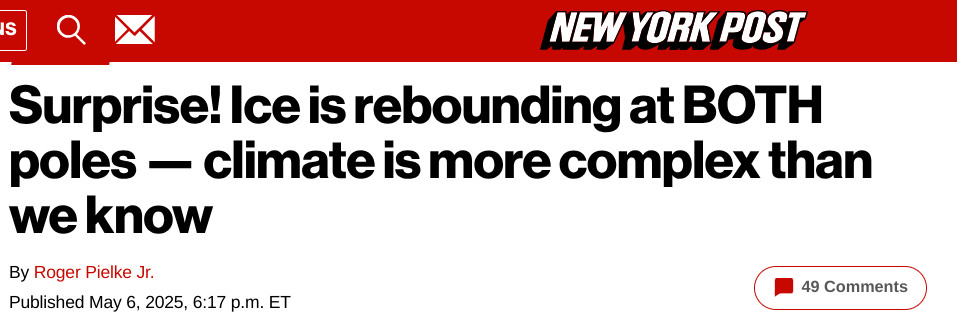
What history tells us is that it is variable in the same way that hurricanes are variable over a forty year cycle. Post mid nineties el nino we had a warming cycle that triggered rapid sea ice loss in the Arctic through 2015..
Now it has begun to thicken And may now thicken for years as it has in the past.
My take home is that we have some established cycles and this polar variation will be almost necessary in order to provide long term climate stability and all plausible feed back loops must work decadially. Better Yet our sunspot cycle is the likely heartbeat of our global climate,
Surprise! Two new studies find ice is rebounding at BOTH poles! ‘Surprising pause’ in Arctic sea ice decline & Antarctica sees ‘record-breaking accumulation of ice’
10:42 am
Roger Pielke Jr. is a senior fellow at the American Enterprise Institute who writes at The Honest Broker on Substack.
Excerpt:
Two new studies show that the Earth’s climate is far more complex than often acknowledged, reminding us of the importance of pragmatic energy and climate policies. One of them, led by researchers at China’s Tongji University, finds that after years of ice sheet decline, Antarctica has seen a “surprising shift”: a record-breaking accumulation of ice. The paper takes advantage of very precise measurements of Antarctic ice mass from a series of NASA satellites called GRACE (Gravity Recovery and Climate Experiment).
Since the first GRACE satellite was launched in 2002, Antarctica has seen a steady decline in the total mass of its glaciers. Yet the new study found the decline reversed from 2021 to 2023. Melting Antarctic ice contributes to global sea-level rise, so a reversal of melting will slow that down. Understanding the dynamics of ice mass on Antarctica is thus essential. The recent Antarctica shift makes only a small dent in the overall ice loss from 2022, but comes as a surprise nonetheless.
[Via: Pielke Jr.’s blog post Ice Surprises: At the South Pole, Wang et al. 2025 find a record accumulation of ice on the Antarctic ice sheet over the period 2021 to 2023, following a steady decrease from 2002 to 2021. The data comes from NASA’s GRACE series of satellites, which have the ability to precisely measure ice mass. The figure below shows that the recent accumulation is small in the context of the multi-decadal decline, but is still characterized by the paper’s authors as a “significant reversal.” The paper makes no predictions of whether or how long the accumulation might continue.]
…
A second new paper, a preprint now going through peer review, finds a similar change at the opposite end of the planet.
“The loss of Arctic sea ice cover has undergone a pronounced slowdown over the past two decades, across all months of the year,” the paper’s US and UK authors write. They suggest that the “pause” in Arctic sea ice decline could persist for several more decades.
[Via: Pielke Jr.’s blog post Ice Surprises: At the other end of the planet, at the North Pole, a new preprint by England et al. identifies a “surprising, but not unexpected multi-decadal pause in Arctic sea ice loss.”]
In 2009, then-Sen. John Kerry warned that the Arctic Ocean would be ice-free by 2013: “Scientists tell us we have a 10-year window — if even that — before catastrophic climate change becomes inevitable and irreversible,” he said.
Today, six years after that 10-year window closed, catastrophic climate change has not occurred, even as the planet has indeed continued to warm due primarily to the combustion of fossil fuels.
Partisans in the climate debate should learn from Kerry’s crying wolf.
On one side, catastrophizing climate change based on the most extreme claims leads to skepticism when the promised apocalypse fails to occur on schedule. …
History tells us that climate can shift abruptly, with profound consequences for society. For instance, the 1870s saw a wide range of climate extremes across the planet, by some estimates contributing to the deaths of 4% of global population.
More recently, the climate extremes of the 1970s led to many new US government programs focused on monitoring and researching climate, such as the National Oceanic and Atmospheric Administration.